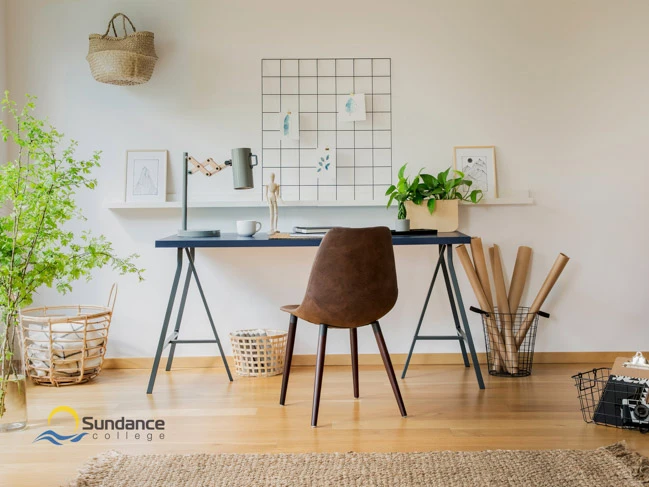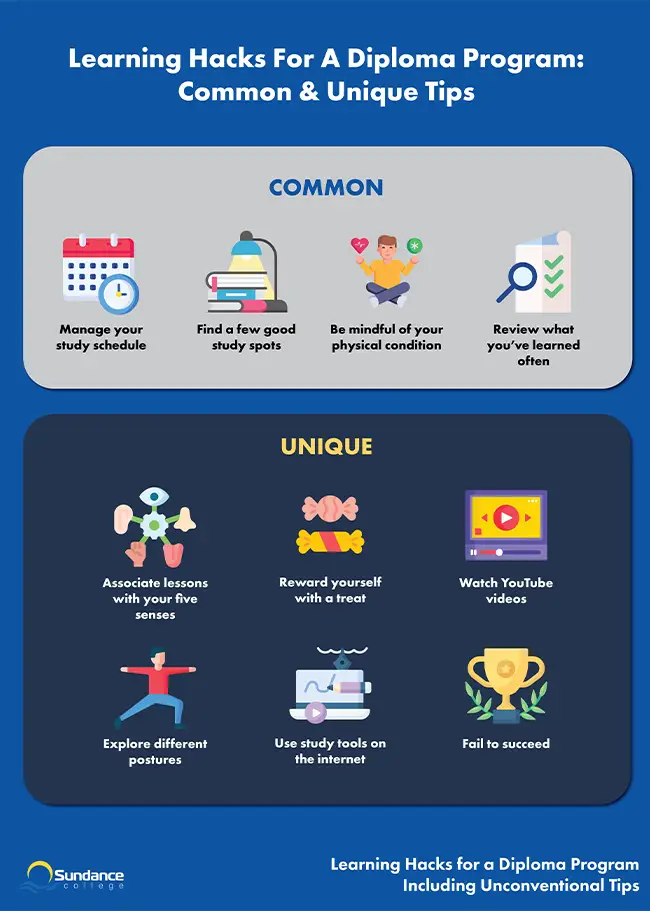Blog / Learning Hacks for a Diploma Program Including Unconventional Tips
Learning Hacks for a Diploma Program Including Unconventional Tips

Explore our Diploma Programs
- Business, Hospitality, and Legal
- Health and Human Services
- Technology
Table of Contents
For those who have made the commitment to bettering their lives through education, studying is an integral component. Chances are, you have been studying for most of your life and may have created an approach that works for you.
If you haven’t, or if you are constantly looking to improve on your study habits for success, you may want to implement some creative study shortcuts to maximize your learning ability.
In this article, we will discuss both basic and unique learning approaches that you can use for effective studying. Study hacks are tips and techniques created to help you study more effectively.
First, we will learn about the universally common tips that have been effective over time such as time management and finding a conducive study space. When this is incorporated with out of the box learning strategies, such as memory improvement techniques and learning motivation secrets, you can create a great foundation for your learning routine. If you are considering, starting, or finishing a diploma program, these tips will help you.
Conventional Tips for Effective Studying
The following tips are considered the best study hacks you can use for your own sessions. They are the most common and basic steps you need to start with before adding other unique techniques to your studies. These study techniques focus on you and your environment and are fundamental to achieving the best results.
Manage Your Study Schedule
Two key strategies that will help you manage your schedule and get the best out of you is knowing when to study and for how long. You will be at your best learning state when you understand these concepts and work towards improving them.
Having a 25-minute focused session followed by a five-minute break period is one of the most optimal ways of studying. It breaks down the workload into smaller and more manageable sessions keeping you more motivated and engaged. This is called the Pomodoro Technique, and it also applies to any sort of focused work that you need to finish.
For timing, you should study whenever you are at your peak focus. There is no universal period of when to study that optimizes your performance however, the only thing that you must consider is avoiding hours of the day when you feel less productive.
Also note that studying should be done regularly and not just as a one-time preparation period for tests. Do not leave studying until the last minute.
Find A Few Good Study Spots

Where you study is just as important as when you study, and when you find yourself in optimal study conditions, you are sure to have a better chance of focusing on studying.
Conventional knowledge describes an ideal study room design as a quiet and well-lit environment, free of any distractions. You should consider having more than one of these study spots so that you can move around and reengage your mind.
Be Mindful Of Your Physical Condition
It is not enough that your environment is the only thing optimized for your study sessions. You also must consider your condition for studying. A person with low-energy would lack the capacity to memorize information and analyze complex ideas compared to someone who is at their best physically.
Make sure you have ample rest and a good meal before studying to avoid low energy and increase your health and learning connection.
Review What You’ve Learned Often
One of the most important things you can do to study effectively is to periodically review sections of your subject after initially going through it. The brain has a limited time of storing information learned, and you must help it remember by constantly refreshing your memory through review sessions and testing.
During review sessions, always allot time to go over what you have previously learned.
Unique Learning Tips and Strategies
While conventional ways of studying are good, it is also important to also explore unconventional study techniques that can give you an extra performance boost during your study sessions.
The following learning hacks will go over unconventional ways of studying like introducing colors, music, and even physical positions. After learning these tips, you can try out which ones work best for you and adopt them.
Associate Lessons With Your Five Senses
Your mind is a powerful tool, and so are your senses. Have you ever heard a song, or smelled a scent that suddenly took you back to a memory that is a few months, if not years, old? It is a common sensation to have a memory flood your mind after sensing a certain trigger through one or more of your five senses.
Try to connect what you are learning to your sight, smell, touch, taste, and hearing. Through this unique sensory learning technique, you can link your learning to a trigger to increase the chances of remembering. Here are some multisensory learning tips for each one of your senses:
Eyes
Visual learners enjoy using association through their eyes. By implementing colors, fonts, different writing surfaces, and mediums, you are linking specific lessons to visual cues that may jolt your memory.
Use different colored highlighters and pens when taking down notes, write on a whiteboard when reviewing topics. See which is the most effective visual technique that works for you.
Ears
Hearing a song passively for a while can make you subconsciously learn its lyrics. The addition of rhythm helps our brain memorize words quickly.
Try listening to songs that correspond with specific sections of your subject. Have it playing while studying or take it a step further and write lyrics pertaining to your test material. Listen to it consistently until you go in for a big exam and you might just belt out the right answers.
Nose
The nose knows. It can remember time and place, and since the nose can remember this well, a good trick is for you to use perfumes during your study session so you can associate the fragrance with a specific subject or course. This may bring up the right memory at the right time.
Tongue
Like the other senses, the tongue can also stimulate memories. This is the reason why you can tell the difference between the taste of Coke and Pepsi. Eating or drinking something with a unique flavour while studying can help you memorize and remember what you have learned.
Hands
The power of touch cannot be underestimated. The tactile sensation is just as powerful as the rest of your senses.
You’ve likely heard that writing things down helps you remember it better. This is true!
For your next study session, try writing on different mediums, paper, chalk board and even typing things out in a computer. See what works best for you in terms of remembering information that you jot down.
Reward Yourself With A Treat

Increasing the drive and motivation for learning is a useful hack for studying. A reward-based learning strategy can be used to incentivize you to get through challenging sessions.
For each study session you have, try to set a goal, it could be reading an entire chapter of a textbook or acing a review quiz. Whatever goal you set, make sure to reward yourself after reaching it. You can give yourself any reward you’d like food, entertainment, or any other worthy treat.
Watch YouTube Videos
Studying with books, pens, and paper is not the only effective tool. Watching videos about the subject or course is another effective way to learn.
A simple search on YouTube can show you great material for any topic you are trying to study. Visual and audio learners would love this method of learning. It can also be a useful tool for hands-on learners as well because it introduces a new activity that refreshes and reengages the mind.
Explore Different Postures
Another aspect of studying you should consider is your physical position. It is easy to lose focus, get distracted, or even fall asleep when you are in the same position for a long period of time.
Switching up your study positions is very important to wake both the brain and body up and get the most out of your study sessions. Try changing your posture as many times as possible while studying. Sitting down, standing up, or lying down can help switch up your energy.
Use Study Tools On The Internet
In this age of technology, the internet can be a powerful tool for research and review.
There are tons of websites that provide you with great resources to supplement your studying. Doing a search on Google about your topic can provide you with many credible sites to learn from. These sites may even explain complex ideas to you in a simpler way.
When provided with notes or reading materials, the first step you should take is to learn the content and try to relate it to real life observations. When in class, make sure to ask instructors questions about topics for clarification.
Aside from research, the internet can also provide you with testing resources. In the same way you found learning sites, you can also find testing sites which you can periodically visit to test your learning.
A combination of these two techniques can help you study faster.
Fail To Succeed

Although it may sound counterintuitive, testing yourself before learning anything about the topic will help you remember things as you learn them. The brain’s cognitive ability is strengthened because of the mental connections established prior to learning. In other words, the brain tends to recall correct information better after making a mistake.
As a technique, try to answer chapter tests or define terms before learning them. After a few days, come back to test yourself again and see how much you remember.
Choosing the Right College
Choosing the right college is the foundational step in your academic journey and pathway to a new career. Applying these conventional and unconventional study hacks in college will help you optimize your study sessions, enhance your retention of information, and navigate your academic journey with greater confidence and efficiency.
In choosing the right college, you will want to consider factors such as college reputation, student support, and the presence of a caring community.
There are also signs that indicate an ideal college like transparency with enrollment, availability of student funding, and the presence of practicum training for students.
Sundance College is Here to Support
Sundance College looks to support you in your academic journey. We offer all the aspects you should look for in the right career college, including, practicum training, industry experienced instructors, and flexible course delivery options.
A diploma can become your ticket to a more fulfilling career, a higher paying job, or a work situation that is more suitable for your lifestyle. Sundance College is ready to help you achieve this.
As she prepares for her practicum at a pharmacy, Pharmacy Assistant student Ghazala B. shares, “Sundance College has been a great resource to achieve my educational goals while on a busy schedule as a mother of three kids. I can’t be thankful enough to my instructor for providing all her students with unwavering support and prompt acknowledgment of our queries.”
Connect with an admissions advisor to discuss which career-focused programs best fits your interests and lifestyle, whether in-class or online.
Subscribe for more career advice
Blog Categories
Share on:
